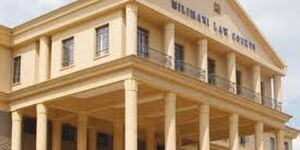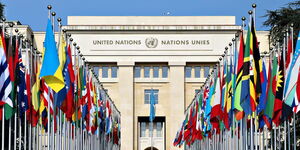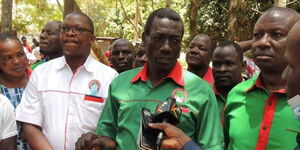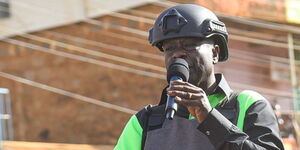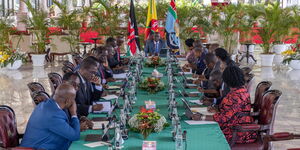Former Attorney General Amos Wako on Monday proposed radical changes in the way Independent Electoral and Boundaries Commission (IEBC) commissioners are selected, which he pointed out will go a long way in helping the country solve recurring problems in the political scene.
Wako, in his submissions to the National Dialogue Committee at the Bomas of Kenya, proposed that the two or three political parties with the largest influence be granted an opportunity to each nominate 1 commissioner.
The veteran politician also proposed that the remaining parties be allowed to jointly nominate another commissioner for appointment.
‘’The persons to be nominated by the political parties should meet the set criteria,’’ said Wako in his submissions.
In his proposals, he referred to the system used in the 1992 appointment of electoral commissioners.
The veteran politician outlined that there are only 3 systems that the country can employ to select IEBC commissioners.
These include; the current system where interested persons apply for the jobs, a government controlled system akin to the one used a long time ago and nomination by political parties which he is advocating for.
He recalled during his stint as Attorney General, he was tasked with selecting District Commissioners who acted as returning officers in general elections.
‘’When the political parties have nominated, then the balance of the commission can be achieved by the system that we already have and with proper amendments to take care of the weaknesses that we have seen,’’ said Wako.
Amos Wako further observed that although the 2010 constitution already offers a good outline guiding how IEBC commissioners should be selected, major weaknesses have manifested themselves, leading to many political players to brand commissioners as partisan.
‘’However we have noted that the selection Board rarely agrees even on methods of scoring points and even the scoring points are highly interfered with,’’ added Wako.
The former AG said the current system of appointment can be refined and his proposals incorporated to create a sustainable selection policy.
Wako also proposed the enactment of a law requiring the electoral commission to open its servers for public audit after every general election to improve transparency.
According to Wako, the audit will help establish election shortcomings and rectify them to ensure Kenyans have confidence in the polls.
The former Attorney General specifically called for a law to be enacted requiring foreign companies contracted to provide election technology to open election servers.
The National Dialogue Committee is still receiving submissions from various societies, lobby groups, and political parties among others at the Bomas of Kenya.

